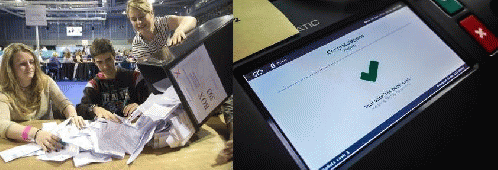By Dave Lindorff
Politicians of both major parties love to boast that the US is the world's oldest democracy and of course a "model for the world." Putting aside the matter of whether or not that is even true (US "democracy" cannot really be said to have begun until women got the vote in 1920, and maybe until the Voting Rights Act of 1965 made voting by blacks truly a reality in parts of the country, and meanwhile Iceland's Althing or parliament dates to 930 AD), the use of electronic voting machines in many jurisdictions has made any such claims a complete joke.
These needlessly confusing, often malfunctioning, and easily hackable devices, which have demonstrably done things like switch whole voting records from one candidate to another, or simply erased all votes cast in a day, and which are so costly that they are used as an excuse to provide only minimal opportunity to vote in many "undesirable" election districts, leading to lines that can require waiting hours outdoors just to get to cast a ballot, belie the claims made for the US to be a beacon of liberty and democratic governance.
So what's the deal with these machines? Why do we even have them?
The goal of any voting system should be accuracy, not speed of counting, and yet we see state after state and county after county getting sold on electronic equipment that is costly, error-ridden, failure prone, and unnecessary. For centuries, people in democracies have voted by raised hands or with paper ballots, with minimal problems given good official and volunteer oversight.
What is driving the switch to machines in the US is the media. The same corporate media that have turned campaigns into battles over soundbites, "gotcha" questions, and a focus on non-issues like whether a candidate's hair is silly looking or whether he/she believes in God.
For the corporate media, Election Day and Election Night are all about money -- specifically a race to "call" election results. Who will be first to announce a winner as the votes are tallied? In an industry that has been paring down news budgets year after year to the point that little serious reporting gets done, vast sums are spent having people stationed at polling places everywhere calling in the tallies as they get read out of the machines.
But why should we care -- particularly when it comes to national races -- when newly elected, or re-elected, members of Congress, and the president, are not actually installed in office until January, more than two months after the voting is over and done with?
(Note: You can view every article as one long page if you sign up as an Advocate Member, or higher).






